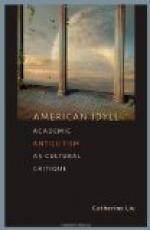He then goes on to catalogue and explain the following instincts which he considered of basic importance in any study of economics: (1) gregariousness; (2) parental bent, motherly behavior, kindliness; (3) curiosity, manipulation, workmanship; (4) acquisition, collecting, ownership; (5) fear and flight; (6) mental activity, thought; (7) the housing or settling instinct; (8) migration, homing; (9) hunting ("Historic revivals of hunting urge make an interesting recital of religious inquisitions, witch-burnings, college hazings, persecution of suffragettes, of the I.W.W., of the Japanese, or of pacifists. All this goes on often under naive rationalization about justice and patriotism, but it is pure and innate lust to run something down and hurt it"); (10) anger, pugnacity; (11) revolt at confinement, at being limited in liberty of action and choice; (12) revulsion; (13) leadership and mastery; (14) subordination, submission; (15) display, vanity, ostentation; (166) sex.
After quoting from Professor Cannon, and discussing the contributions that his studies have made to the subject of man’s reaction to his immediate environment, he continues:—
“The conclusion seems both scientific and logical, that behavior in anger, fear, pain, and hunger is a basically different behavior from behavior under repose and economic security. The emotions generated under the conditions of existence-peril seem to make the emotions and motives generative in quiet and peace pale and unequal. It seems impossible to avoid the conclusion that the most vital part of man’s inheritance is one which destines him to continue for some myriads of years ever a fighting animal when certain conditions exist in his environment. Though, through education, man be habituated in social and intelligent behavior or, through license, in sexual debauchery, still, at those times when his life or liberty is threatened, his instinct-emotional nature will inhibit either social thought or sex ideas, and present him as merely an irrational fighting animal. . . .
“The instincts and their emotions, coupled with the obedient body, lay down in scientific and exact description the motives which must and will determine human conduct. If a physical environment set itself against the expression of these instinct motives, the human organism is fully and efficiently prepared for a tenacious and destructive revolt against this environment; and if the antagonism persist, the organism is ready to destroy itself and disappear as a species if it fail of a psychical mutation which would make the perverted order endurable.”




